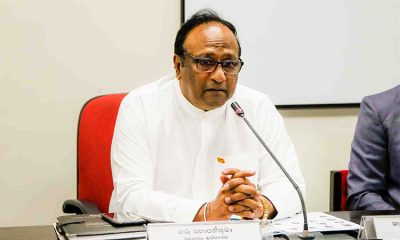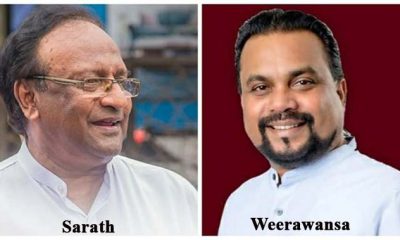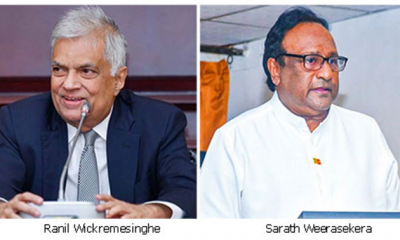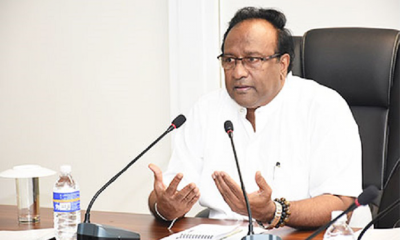News
Govt. should be ashamed of delay in serving justice

– Head of National Security Sectoral Oversight Committee
SLPP MP’s violent death during Aragalaya:
By Shamindra Ferdinando
Government parliamentary group member Rear Admiral Sarath Weerasekera (Retd.) says the ruling party should be ashamed of its pathetic failure to ensure the speedy conclusion of investigations into the killing of Polonnaruwa District SLPP MP Amarakeerthi Atukorale at Nittambuwa on 09 May, 2022.
The government and police should explain the status of the investigation, the former Public Security Minister said, adding that the Parliament, too, should look into this matter.
Referring to the assassination of sitting and former MPs over the past several decades, during the northern and southern conflicts, the Colombo District lawmaker emphasised that there had never been a public lynching of an elected MP. The ex-Minister said that his colleague had been killed while the latter was on his was back home after attending a Temple Trees meeting chaired by the then Prime Minister Mahinda Rajapaksa.
Responding to The Island queries, MP Weerasekera disclosed that he had raised the issue at an SLPP Political Committee meeting held at former Prime Minister Mahinda Rajapaksa’s official residence at Wijerama Mawatha recently. According to him, among those present were SLPP founder Basil Rajapaksa and their National Organiser Namal Rajapaksa as well as Gamini Lokuge and C.B. Ratnayake.
The former Navy Chief of Staff emphasised that Nittambuwa police and the military could have easily saved the lives of the MP and his police bodyguard if they had swiftly intervened. Instead, they had simply watched a mob that included two Army commandos killing the MP and his police bodyguard, MP Weerasekera said, pointing out that all persons produced in court had been granted bail.
The ex-Minister said that he had asked the SLPP Political Committee how the party could expedite the case. He said he had pointed out to the Political Committee that police and military personnel could have opened fire without specific directives to do so if the lives of people, regardless of their standing in society, were in danger.
MP Weerasekera said that Rambukkana police had averted a major disaster by opening fire in a desperate bid to prevent a mob from setting fire to a bowser carrying 33,000 litres of petrol placed on 19 April, 2022. MP
Weerasekera quit his portfolio on the day before that incident at Rambukkana and Chief Government Whip Prasanna Ranatunga succeeded him as the Public Security Minister.
Declaring that during the public protest campaign (March 31, 2022 to July 20, 2022) the police and the military had been directed not to intervene at all, MP Weerasekera said that though he had sought an explanation from State Defence Minister Pramitha Bandara Tennakoon, in writing, regarding the inaction on their part, he was yet to receive ministerial response.
MP Weerasekera said he had raised the issue with State Minister Tennakoon, in his capacity as the Chairman of the Sectoral Oversight Committee on National Security. Gamini Lokuge and C.B. Ratnayake, too, had stressed the need for early action against those responsible for the cold blooded killing of the MP and his police bodyguard in public, Weerasekera said, insisting that the deplorable manner in which the probe into the killing of Athukorale was hand had led to a severe erosion of public confidence in the SLPP. “How could we reassure the public of security when those responsible for the killing of MP Atukorale and his police bodyguard were yet to be punished,” Weerasekera asked.
Weerasekera said that he was quite surprised and disappointed by media reports, in the second week of February this year, that the Attorney General challenged the Trail-at-Bar of the Gampaha High Court over 37 accused of the Nittambuwa killings being granted bail. The media quoted Deputy Solicitor General (DSG) Janaka Bandara as having told the HC that granting bail to the accused of such a criminal case, without consulting the AG, was against the law, MP Weerasekera said.
The DSG is on record as having said that the consent of the AG is compulsory in such a case. MP Weerasekera said that according to media reports, the accused had been released on two separate days. Five persons had been released initially and then the remaining 32 were released, MP Weerasekera said, adding that the SLPP couldn’t ignore that the AG challenged the Trial-at-Bar decision.
MP Weerasekera said that he intended to ask Prime Minister Dinesh Gunawardena to take up the issue with members of the Cabinet.
Latest News
Enforcing the law against bribery and corruption is not an act of political revenge but a profound human responsibility – President
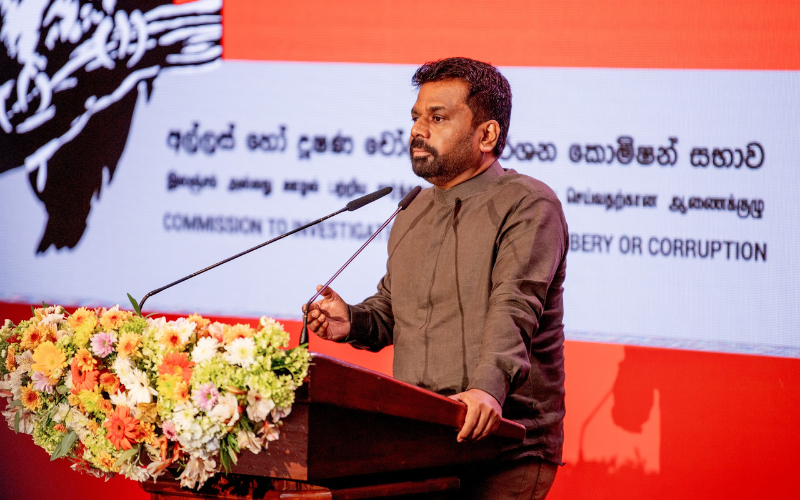
President Anura Kumara Disanayake emphasized that since assuming office, the current government has taken decisive steps to free the process of combating bribery and corruption from political interference. He reiterated that while the political mechanism has been liberated from engaging in such crimes, it is now the responsibility of the administrative machinery operating beneath that political structure to fall in line and correct its course without delay.
He explained that a grace period of six months has already been provided for the state officials to adjust to this new direction. The President firmly warned that if the public service mechanism fails to act appropriately within this period, the government will not hesitate to take firm legal action against those officials from May onwards.
President Disanayake expressed these views on Wednesday (09), participating in the launch of the National Anti-Corruption Action Plan 2025–2029, held at the Bandaranaike Memorial International Conference Hall (BMICH) in Colombo.
Bribery and corruption have proliferated, undermining the integrity and values of the country’s state institutions .He observed that over the past six months of the present government, no section of the public service has been allowed to collapse and that if officials continue to resist change, the government will proceed to remove and replace them after May.
The President pointed out that bribery and corruption have caused the nation to fall behind for decades in the eyes of the world. He reiterated that enforcing the law against these crimes is not an act of political revenge but a profound human responsibility.
The President stressed the need to build a society that respects the law and fears wrongdoing, adding that conducting lectures or workshops alone would not suffice in achieving this goal. He emphasised that people must practically witness that any person who commits a crime will be subjected to punishment under the law.
President Disanayake noted that corruption in Sri Lanka ranges from minor bribery, from the village level to bringing poor quality medicinal drugs. Bribery and corruption have escalated from minor instances to grave financial crimes, extending from local councils to looting the Central Bank.
The President further said that previous rulers safeguarded and protected those engaged in corrupt activities.
He also revealed the emergence of a network of thieves within several state administrative institutions and certain bodies responsible for enforcing the law, comprising underworld elements involved in bribery and corruption. He confirmed that these criminal networks have already been identified and assured that measures will be implemented in the future to dismantle and eliminate them.
President Disanayake solemnly pledged that the responsibility of eradicating bribery and corruption will not be passed on to the next generation but will be resolved within this generation itself, under the leadership of the present government.
Drawing a comparison with India, which gained independence a year before Sri Lanka, the President noted that through a consistent national policy framework, India has successfully achieved space exploration and built a massive workforce in the software industry. In stark contrast, he pointed out that Sri Lanka, due to poor decisions made by its political leadership, was declared a bankrupt state in 2022.
He further stated that the current government has taken on the responsibility of leading Sri Lanka towards the international stage through a national policy framework that ensures transparency and accountability for every rupee spent from public funds.
The President added that by implementing this framework, it is possible to build public trust in law enforcement and judicial institutions and that it must be made clear to the people that there will be no mechanism available for anyone to escape the law after committing a crime.
He stated that the purpose of the National Anti-Corruption Action Plan 2025-2029 is to guide the country towards becoming a nation of integrity. The government plans to establish Internal Affairs Unit within all state institutions including the Presidential Secretariat and implement a system for monitoring these units through digital technology to ensure accountability and transparency.
The Action Plan has been designed around four key strategic priority areas: prevention and public participation, institutional strengthening and the enforcement of law along with reforms in law and policy.
The President highlighted that eliminating bribery and corruption is one of the most decisive factors in a country’s development and progress. In Sri Lanka, the Commission to Investigate Allegations of Bribery or Corruption (CIABOC) has been identified as the leading state institution entrusted with strengthening this mechanism. Accordingly, it was recognised that a robust national anti-corruption policy that operates across all sectors is essential to creating a corruption-free society.
In preparing this Action Plan, CIABOC engaged all relevant stakeholders by conducting extensive programmes at both national and provincial levels. A broad public consultation process was carried out, including a comprehensive survey to assess public opinion on corruption through media announcements in all three languages and via social media networks.
This process gathered proposals from a diverse range of participants, including Members of Parliament, judges, state officials, the private sector, international organisations, civil society organisations, community-based organisations, religious groups, persons with special needs, media professionals, youth, children and the general public. Additionally, foreign state experiences and suggestions from various groups across all provinces were taken into consideration when formulating the Action Plan.
By implementing this National Anti-Corruption Action Plan, the government hopes to foster a committed citizenry determined to combat corruption, a political will fully supportive of this effort, a comprehensive legal framework and a disciplined, transparent public service across all sectors, with the shared vision of building a country of integrity for future generations.
Addressing the event, the Japanese Ambassador to Sri Lanka, Hideaki Mizukoshi, stated that Corruption remains a great challenge for many countries, including Sri Lanka as it undermines economic growth, weakens public trust in government institutions and discourages foreign investment. However, he noted that due to the reform initiatives of the present government, investors are once again showing increasing interest in Sri Lanka.
Ambassador Mizukoshi further stated that Japan has always believed that transparency and good governance are fundamental pillars for sustainable economic development and therefore, has supported anti-corruption initiatives globally for over a decade.
Meanwhile, the UNDP Resident Representative in Sri Lanka, Ms. Azusa Kubota, stated that according to Sri Lanka’s first-ever National Taxpayer Perception Survey conducted last year, 84% of respondents indicated that corruption directly affects their willingness to pay taxes.
She further noted that corruption deters investment, increases the cost of doing business, undermines sustainable development and human security, and causes an estimated annual loss of USD 1.3 trillion for developing countries.
Referring to the Budget Speech delivered by the President, Ms. Kubota emphasised that the State must be accountable for every cent of taxpayers’ money and stated that this Action Plan would serve as a roadmap for transforming Sri Lankan society.
The event was attended by the Chief Justice, Supreme Court Justice Murdu Nirupa Bidushinie Fernando; the Attorney General, Parinda Ranasinghe PC; the Secretary to the President, Dr. Nandika Sanath Kumanayake; the Chairman of CIABOC, former High Court Judge Neil Iddawela; the Director General of CIABOC, R.S.A. Dissanayake; the Commanders of the Tri-Forces; the Inspector General of Police; senior officials from the security forces and a large number of state officials.
Latest News
Sun directly overhead Hatthikuchchi, Kalankuttiya, Halmillewa, Ipalogama, Palugaswewa and Habarana at about 12:11 noon. today [10]

On the apparent northward relative motion of the sun, it is going to be directly over the latitudes of Sri Lanka during 05th to 14th of April in this year.
The nearest areas of Sri Lanka over which the sun is overhead today (10th) are Hatthikuchchi, Kalankuttiya, Halmillewa, Ipalogama, Palugaswewa and Habarana at about 12:11 noon.
News
LG elections to be staggered
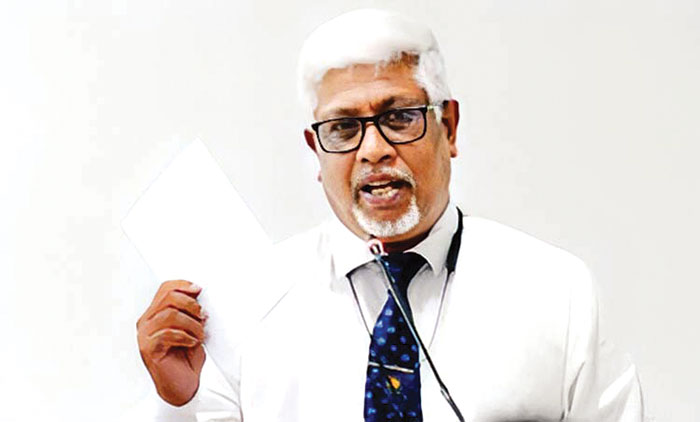
Signs are clear that the local government (LG) elections, originally scheduled for 06 May, will have to be held on a staggered basis, as nomination lists in respect of about 200 out of 339 LG institutions have been challenged before the Court of Appeal, according to sources.
Those who have filed cases in the Court of Appeal seek writs against holding the elections. The final date for filing cases is 21 April.
By yesterday only 113, out of 339 local government bodies, had been cleared for the 06 May elections, with no rejections of nomination lists, or objections, sources said. The nomination lists for 226 local government bodies have been rejected, and candidates on these rejected lists are entitled to file cases against the Election Commission (EC) until 21 April.
The Court of Appeal (CA) has ordered that some of the lists rejected by the Election Commission be accepted. However, the EC is planning to challenge all CA orders before the Supreme Court.
When contacted for comment, Director General of the Election Commission, Saman Sri Ratnayake, told The Island that all arrangements had been made to hold the elections on 06 May, in accordance with the provisions of the Local Authorities Elections (Amendment) Act No. 16 of 2017.
“We will hold elections to the local government bodies for which there are no legal barriers, and this will depend on the final decision of the courts,” Ratnayake said, adding that elections to other local government bodies would be held on later dates.
By Saman Indrajith
-

 Business4 days ago
Business4 days agoColombo Coffee wins coveted management awards
-

 Business6 days ago
Business6 days agoDaraz Sri Lanka ushers in the New Year with 4.4 Avurudu Wasi Pro Max – Sri Lanka’s biggest online Avurudu sale
-

 Features5 days ago
Features5 days agoStarlink in the Global South
-

 Business7 days ago
Business7 days agoStrengthening SDG integration into provincial planning and development process
-

 Business6 days ago
Business6 days agoNew SL Sovereign Bonds win foreign investor confidence
-

 Features2 days ago
Features2 days agoSri Lanka’s Foreign Policy amid Geopolitical Transformations: 1990-2024 – Part III
-

 Features5 days ago
Features5 days agoModi’s Sri Lanka Sojourn
-

 Midweek Review2 days ago
Midweek Review2 days agoInequality is killing the Middle Class



